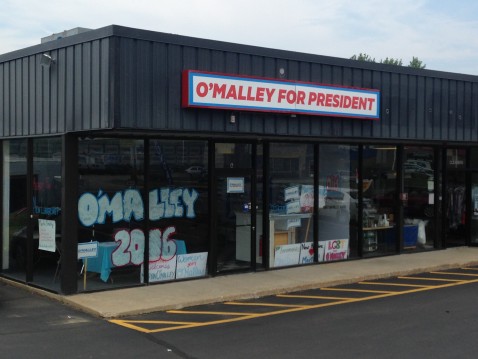By TROY JEFFERSON and DAN RUSSO
Capital News Service
WASHINGTON — Former Maryland Gov. Martin O’Malley’s dismal finish Monday in the Iowa caucuses convinced him to end his presidential bid even as the Democrats were still counting votes. He had hoped to emerge as the alternative to Hillary Clinton, but instead ran into the Bernie Sanders buzzsaw.
“O’Malley has been left to dry, he just hasn’t caught fire in any way,” said Geoffrey Skelley, a political analyst at the University of Virginia’s Center for Politics. “O’Malley never really has had any moment in the polls where he has looked strong.”
Clinton and Sanders dominated the Iowa caucuses Monday, nearly splitting the vote at 49.9 percent and 49.6 percent, respectively, while O’Malley polled a paltry 0.6 percent of the votes.
“He couldn’t get to the right of Hillary and he couldn’t get to the left of Bernie Sanders,” Maryland Senate President Mike Miller Jr., D-Calvert, told reporters at the State House in Annapolis.
When he announced his candidacy last May, O’Malley thought he saw an opening, Skelley said. Clinton’s decision to run had discouraged many other potential Democratic candidates from entering the race.
“I think (O’Malley) got into the race knowing that it was unlikely that a lot of major candidates were going to run,” Skelley said. “There was a thinking that, ‘Now I have a chance to break through here.’”
But neither the synthesis of his message on his campaign signs – “Restore the American Dream” – nor his polished debate performances seemed to connect with Iowans. Even playing guitar and singing at some stops did not budge his Iowa poll numbers, which stayed in the single digits and peaked with a Real Clear Politics poll average of 6.3 percent at the end of the first week of January.
O’Malley wrote a letter to supporters on his campaign website announcing the suspension of his campaign.
“Together we all stood up for working people, for new Americans, for the future of the Earth and the safety of our children,” O’Malley said. “We put these issues at the front of our party’s agenda—these are the issues that serve the best interests of our nation.”
O’Malley hoped his achievements as governor in Maryland – he oversaw the legalization of same-sex marriage, the repeal of the death penalty and a major overhaul of the state’s gun laws – would gain traction with voters and the more liberal members of the Democratic Party, but that never came to pass, according to analysts.
“[O’Malley] is an establishment Democrat that tried to run as an outsider, an anti-establishment campaign that has hurt him,” said Todd Eberly, coordinator of Public Policy Studies at St. Mary’s College of Maryland.
Instead, Bernie Sanders filled the role of Clinton’s chief rival, snatching up the more liberal wing of the Democratic Party. Sanders’ surprise emergence prevented O’Malley from rising in the polls, Skelley said.
“Bernie Sanders has become the other person in the race,” Skelley said.
Another problem for O’Malley was his inability to raise money compared to his competitors.
By the end of 2015 O’Malley raised only $4.6 million and accrued $535,000 in debt, according to a campaign analysis from the Center for Responsive Politics, a nonpartisan research group that monitors campaign spending. Sanders and Clinton dwarfed O’Malley’s fundraising efforts, collecting $74.3 million and $112 million, respectively, by the end of 2015.
Despite struggling to raise money and being so far behind in the polls, O’Malley stayed in the race longer than many political observers expected.
“If you have the presidential bug, then you’re going to hang around for as long as you can,” Skelley said.
Analysts said O’Malley’s poor showing at the Iowa caucuses was not his fault. To the contrary, O’Malley was “warmly received” at Democratic events, said Dennis Goldford, political science professor at Drake University in Des Moines.
“O’Malley was appealing in a way to their heads, not their hearts,” Goldford said. “Sanders certainly captured the hearts of a lot of supporters, certainly young ones.”
While the Washington Post reported that O’Malley said he has no interest in a Cabinet position in another administration, Skelley and Eberly think there is a chance for O’Malley to run again in 2020 if Clinton doesn’t win this election.
While O’Malley could use the exposure from his campaign as a springboard for future presidential elections, Skelley suggested that other more prominent Democratic candidates, such as a sitting governor or Sen. Kirsten Gillibrand, D-N.Y., could overshadow him.
(Capital News Service Annapolis Bureau reporter Leo Traub contributed to this story.)

